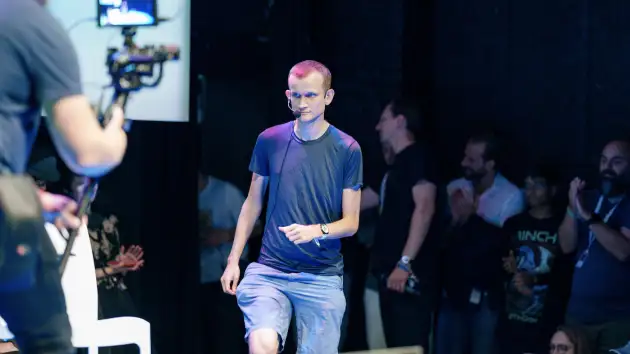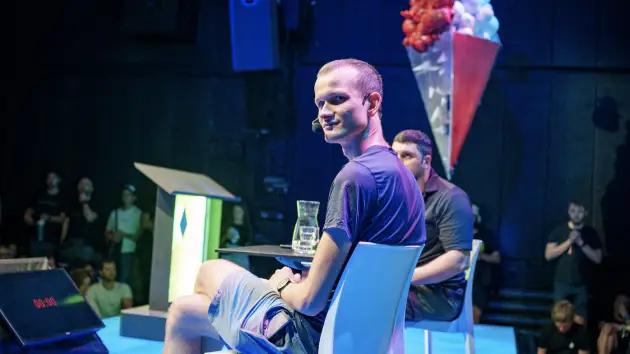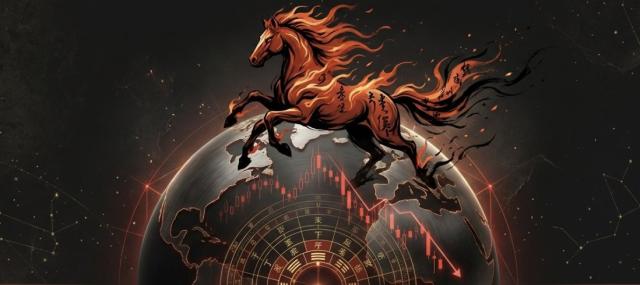Compiled by: Elsa
Editing and typesetting: Soleil
Design: Daisy
Original English version published on September 22, 2023
Translator’s Preface
This article is based on an interview with Ethereum founder Vitalik Buterin conducted by CNBC in September 2023. The article describes Vitalik's situation in the face of global cryptocurrency suppression policies and his confidence in Ethereum and his passion for crypto technology. In the interview, he talked about how he and the Ethereum Foundation responded to the increasing cryptocurrency suppression in the United States and expressed his concern about the development of cryptocurrencies in developing countries. He hopes that technology can truly be used by mankind and play a positive role. In him, we see that the crypto world is not just hype and speculation, and we can really use crypto technology to do something meaningful for human development.
Key points:
1. Vitalik Buterin, co-founder of the second most popular cryptocurrency, spoke with CNBC’s MacKenzie Sigalos in Prague, one of Europe’s new cryptocurrency hotspots.
2. He discussed the growing cryptocurrency crackdown in the United States and suggested that developing countries continue the cryptocurrency revolution.
3. He also talked about the huge role he played in the cryptocurrency he created, but believed that his work (Ethereum) has its own life and is therefore more resistant to government suppression.

Ethereum co-founder Vitalik Buterin in Prague, where he joins like-minded programmers in their quest to change the world through crypto
CNBC
PRAGUE — For Vitalik Buterin, the concept of home is fleeting.
The Russian-born programmer who created Ethereum when he was 18 or 19 doesn’t stay in any one city for long these days. And the number of places he won’t go is growing.
“There are countries that I would have loved to visit three years ago that I’m very apprehensive about going to today,” Buterin told CNBC in the Czech Republic.
Buterin specifically named his native Russia as one of the destinations he’s now avoiding. The Canadian immigrant is of Ukrainian and Russian descent, but he actively supports the resistance movement in Ukraine. It’s also clear that pursuing privacy technology and open source code in certain global jurisdictions carries risks, giving Buterin new hesitations — for example, the creator of the open source protocol Tornado Cash faces charges in both the Netherlands and the United States. In the still-nascent cryptocurrency market, some people use Tornado Cash to protect their privacy, but the mixing service can also be used by criminals or nation-states to launder money. Many in the industry worry that the crackdown will not only hit the bad guys who use the tool, but also set a dangerous precedent for developers who build tools.
“I’m definitely more worried about that even in countries that the mainstream media thinks are still pretty normal,” Buterin said.
This decentralized lifestyle suits Buterin well. The 29-year-old programmer’s impact on the crypto space goes beyond lines of code or geographic location. Prague is a new center of gravity where he now finds refuge, where he joins like-minded programmers in their quest to change the world through crypto.

Ethereum co-founder Vitalik Buterin speaks at ETHPrague 2023, an international conference that attracts crypto developers from around the world
Photo: Pavel Sinagl
We meet in a sparsely furnished room on the top floor of a sprawling industrial complex in the Holešovice district. Once associated with industrial facilities like slaughterhouses and steam mills, the area is now home to bohemian artists and some of the most rebellious crypto believers. Inside the seemingly ordinary building is a honeycomb maze of winding staircases and labyrinthine corridors leading to its fortress-like interior, which, for those unfamiliar with crypto, mirrors its complexity.
Today, the biggest challenge facing Buterin and the Ethereum community is ensuring that the cryptocurrency provides real value to people.
“The way I look at the Ethereum ecosystem is that the last ten years were about trying and perfecting Ethereum. This ten years is the ten years where we have to actually build something that people use,” Buterin said, clasping his hands together and leaning forward from his ergonomic kneeling chair.
He’s arguably the most influential crypto developer working today, but Buterin didn’t seek the spotlight when he wrote the ethereum white paper in 2013. Still, after years of shunning public acclaim and turning down countless media speaking invitations, he can’t escape fame — or the glowing words that describe him.
As crypto markets peaked in 2021, Buterin, 27, was named the world’s youngest crypto billionaire. In China, he’s known as “V God,” Time magazine called him crypto royalty in an April 2022 cover story, and almost everywhere he goes on the planet, he’s swarmed with fans eager for his attention — and selfies.
But in reality, Buterin is not such a person.
He’s not the prince of crypto. He’s not the zealot leader of a new generation of cypherpunks. He’s not the hardest workaholic or the biggest nerd. He regularly donates his wealth to worthy causes, lowering his net worth. And, by his own estimation, he’s not the ultimate authority on the Ethereum network.
Yet he is a man who cares deeply about achieving his vision: a world where everyone, no matter where they live, has equal access to money.

ETHPrague 2023 will be held in Paralelní Polis, Czech Republic
Photo: Pavel Sinagl
Buterin found that cryptocurrencies have made the biggest impact in emerging economies — a phenomenon that has gained momentum in recent years.
“Some of the things we often think of as basic and boring are actually providing a lot of value to them, like normal payments and savings,” Buterin said of low-income countries.
“Being able to participate in the international economy — those are things they don’t have, and that could provide tremendous value to people there,” Buterin told CNBC. “It’s hard to get interested in something as abstract as decentralized social media when you don’t have those basic things.”
As U.S. investigators brought criminal charges against Sam Bankman-Fried and others, and federal regulators such as the Securities and Exchange Commission began cracking down on so-called unregistered securities transactions, activity in the cryptocurrency space began to shift overseas.
In contrast, while investors in the United States often view cryptocurrencies as a chance to get rich quick and as a way to trade volatility in markets that are less regulated than traditional securities, Buterin generally prefers to focus on developing markets around the world — including Africa, which he visited in February — where he sees real-world use cases for the technology he helped build in everyday life.
“When I visited Argentina at the end of 2021, a lot of people were using crypto, a lot of people liked crypto. I was actually recognized more times on the streets of Buenos Aires than I was in San Francisco,” he said.
But Buterin told CNBC that for cryptocurrency to truly work on a global scale, it must eventually move away from centralized entities like custodial exchanges and must be easier to use.
“I could easily find coffee shops that accepted Bitcoin and Ethereum — but the problem was, they were all using Binance,” Buterin said.
He said he appreciates centralized exchanges like Binance, which offer a smoother user experience for non-technical people living in countries with a GDP per capita of less than $10,000. However, he believes it must be more decentralized.
“These centralized players are vulnerable to both outside pressure and their own corruption,” he said.
Last year (2022), a series of bankruptcies in the cryptocurrency space exposed fraud across the industry.
Many people became wealthy before the rate hikes, and then the chain reaction of Luna’s collapse in May 2022 caused the entire market to fall, triggering a crypto winter that continues to this day. For example, Bankman-Fried, the former CEO of the now-bankrupt cryptocurrency exchange FTX, faces criminal charges for orchestrating a multi-billion dollar fraud scheme. Binance, the world’s largest cryptocurrency exchange by trading volume, is being sued by the U.S. Securities and Exchange Commission (SEC) and the Commodity Futures Trading Commission (CFTC) for a series of charges, including allegations that Binance mixed billions of dollars worth of user funds with its own funds.
Buterin said he believes the ideal solution is to write better code so that users can transact directly on-chain, rather than blindly trusting a centralized intermediary to act in the best interest of its customers.
“We need an on-chain experience that’s truly usable by regular people,” Buterin said.
“We need Ethereum payments to be able to be processed in a way that costs less than a nickel per transaction; in a way that the experience isn’t terrible and there isn’t a 2.3% chance of random failure; in a way that you don’t need a PhD in Ethereum science to figure out what’s going on,” he said.

Ethereum co-founder Vitalik Buterin speaks at ETHPrague 2023, an international conference that attracts crypto developers from around the world
Photo: Pavel Sinagl
Privacy and security are also top priorities.
“People need to have really secure wallets where even if they lose their private keys, they don’t lose everything,” Buterin added.
National digital currencies could offer the ease of use he envisions, but he believes decentralization is also crucial, otherwise they will evolve into just another version of the existing banking system — just with more surveillance built in.
“I think five years ago I was more hopeful about this space, and probably naively so, because there were a lot of people who wanted to do things like make countries blockchain-friendly and provide real transparency and verifiability guarantees and some level of real privacy,” Buterin said of central bank digital currencies (CBDCs).
A CBDC is a blockchain-based virtual currency that is fully regulated and backed by a country’s central bank. The People’s Bank of China is arguably the leader in the CBDC space to date, having been piloting CBDCs for nearly a decade. As of June 2023, transactions using the digital yuan (e-RMB) have reached nearly $250 billion. But as CBDCs have become more popular, concerns have arisen about the financial surveillance and monitoring tools that may be included in these government-issued digital currencies.
“As these projects mature,” Buterin said, “the privacy part fades away and everything gets closer and closer to 1.0. We end up with systems that are not actually that much better than existing payment systems because they’re ultimately just different front ends for existing banking systems.”
“They end up being much less private and they basically break down all the existing barriers against businesses and governments at the same time,” he said.
Building a Brave New World
Vitalik's father Dmitry introduced him to Bitcoin in 2011.
Vitalik and Dmitry Buterin, a computer scientist who once lived outside Moscow, were both interested in the idea of a decentralized currency that wasn’t controlled by a government or central bank. But Vitalik was keen to advance this new decentralized ledger technology so that it could be used more widely.
What ultimately made him famous was embedding smart contracts — programmable code designed to replace middlemen, such as banks and lawyers, in certain types of business transactions — into blockchains. It was a game-changing innovation for the industry, leading to a surge in projects and initial coin offerings (ICOs) on Ethereum.
Today, the network has become the main building block for various crypto projects, including non-fungible tokens (NFTs), decentralized finance (DeFi), and Web3. The latter is still an elusive buzzword that stands for the third generation of the internet: it is decentralized and built using blockchain technology. Meanwhile, Ethereum’s native token (Ether) is the world’s second-largest cryptocurrency by market capitalization after Bitcoin.
In Ethereum circles, hackers are called BUIDLers — a deliberate misspelling of “builders” in a nod to Bitcoin’s HODL, or “Hold on for dear life” meme. The meme comparison may seem silly, but it nails the difference between these two very different groups of people.
While Bitcoin developers tend to move slowly in terms of development, prioritizing security and decentralization, Ethereum programmers are more daring. While they don’t necessarily break existing systems in their development process, they do move quickly and actively make adjustments.
Last year, for example, the Ethereum network fundamentally changed the way blockchains secure the network and verify transactions, slashing its energy consumption by more than 99% in the process. Prior to this upgrade, both the Bitcoin and Ethereum blockchains had a large network of miners around the world who run highly specialized computers to verify transactions by calculating mathematical equations. Proof of Work consumes a lot of energy and is one of the most criticized points in the industry.
But with the upgrade, Ethereum moved to a system called proof-of-stake, which replaces miners with validators. Instead of running large numbers of computers, validators use existing reserves of ether to verify transactions and mint new tokens.
Buterin insisted that Ethereum’s move to a proof-of-stake model would be more resistant to government intervention.
“Proof of stake is actually easier to anonymize and harder to shut down than proof of work,” he said. “Proof of work requires a lot of physical equipment and a lot of electricity. That’s exactly what the drug enforcement agencies have been investigating for decades.”
Regarding the Ethereum network, he said: “On the other hand, you have your laptop. You just install a VPN somewhere and hide it in a corner. It’s not perfect, but it’s definitely easier to hide.”
The programmer behind the scenes
In previous appearances in Denver and Paris, Buterin’s stage presence had a subtle unease about it. But in the one-on-one in Prague, he really came alive, dropping those little tricks and effortlessly shifting from elusive programmer persona to open-minded educator.
His transparent communication style, combined with his willingness to engage in deep philosophical discussions on topics like quadratic funding (funding Ethereum public goods projects by crowdfunding a central cryptocurrency treasury and then using an algorithm designed to optimize spending decisions) and concepts like soul-bound digital identities on the blockchain, have made him a trusted thought leader within the cryptocurrency community.
Notably, Buterin was also more than willing to answer any questions posed to him — especially those critical of the Ethereum network and the scope of his current leadership.
Take, for example, his prominent role in the cryptocurrency he created. Unlike the anonymous Satoshi Nakamoto, the creator of Bitcoin, Buterin is more like the face of Ethereum.
Some see this as a significant weakness of the network, since governments could target Buterin or the Ethereum Foundation. Buterin dismissed these arguments. He said that five years ago, a lot of things depended on him and the foundation, but today, clients — software applications that run independently on top of the blockchain — do a lot of the work. Ethereum, he said, has become an autonomous ecosystem with no single point of failure.
“Even if the foundation gets some magical freezing order in every jurisdiction at the same time, and if something happens to me at the same time, the decentralized group of Ethereum client maintainers can continue to operate,” Buterin explained.
They call it the philosophy of subtraction.
“I think one way to describe its goals is basically that the Ethereum Foundation is not trying to be a zealot, or a long-term operator, or a juggernaut, or anything like that,” he said. “The goal of the Ethereum Foundation is to foster things that, once they start, can continue in a completely independent way.”
As for the next development of Ethereum, Buterin said that the top priority is to focus on privacy and scalability through ZK Rollups.
ZK-rollups are where transactions are bundled together and executed off-chain. This second layer technology plays an important role in future upgrades and will ultimately help make Ethereum faster and cheaper to use.
“There are definitely divergent interests to a certain extent, and I think the ecosystem really needs to find a way to fight for the right to continue to build things in the way that we’ve been accustomed to for thousands of years for privacy,” Buterin said.
To clarify: Buterin does not consider himself to be targeted by any particular country, nor does he consider himself a lawbreaker, but he has concerns about visiting certain countries because of his work.







